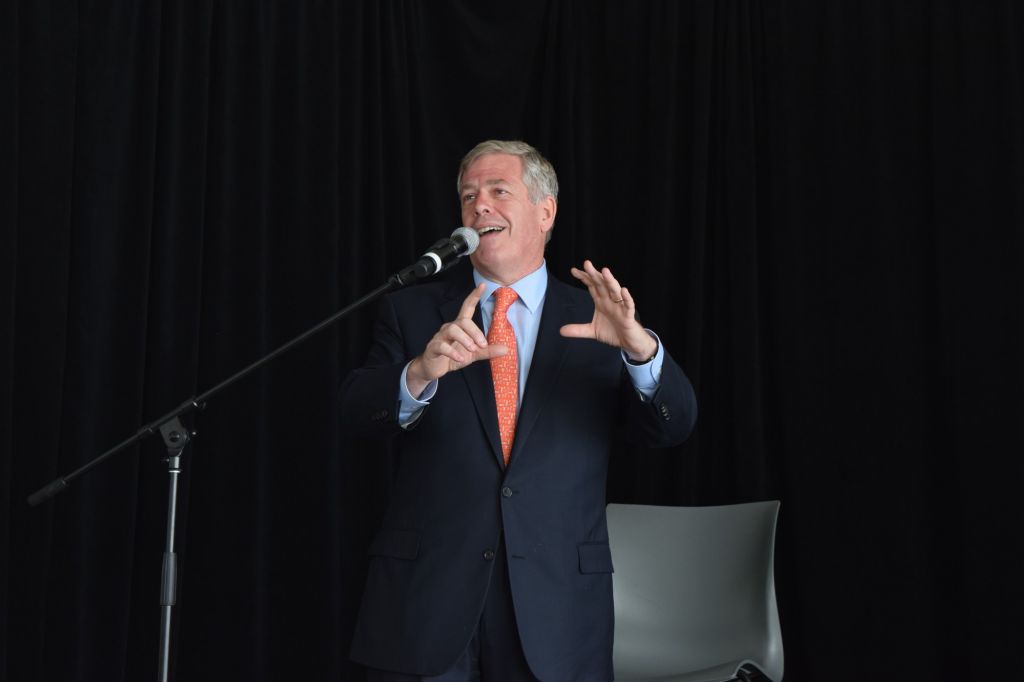Journalism and public relations students were blessed with a talk on March 13 by Hill and Knowlton executives Peter Donolo and Jason MacDonald, who spoke about their experiences working as directors of communication with Jean Chrétien and Stephen Harper.
While involved in politics, Donolo and MacDonald were on opposite ends of the spectrum, Donolo working for the Liberal party and MacDonald the Conservatives. Today, they put political differences aside and work together with Hill and Knowlton, one of the leading public relations firms in Canada.
While they found success in their respective careers, neither formally went to school for those fields. “(In your career) you don’t necessarily have to have a plan,” said MacDonald. “Take advantage of all the opportunities you get and the different jobs you have because you never know what it can turn into.”
Donolo, who worked under Chrétien as director of communications for six years never finished his masters in history after a bachelors in science. His first job was in advertising, then worked up the ranks before getting involved in communications “You gotta be good, but you have to be lucky,” said Donolo.
Donolo speaks with a sense of humour, throwing out jokes in-between his stories and anecdotes. “Rule one: don’t work for a jerk, life is too short,” he said referencing his time at Air Canada. “I quit when I don’t like my boss. If you don’t respect or believe in the work your boss is doing, you have a problem.”
MacDonald spent two years as director of communications under Harper, and shared the same opinions on how they needed to conduct themselves in parliament. The hardest of these aspects, is leaving.
“If I’m going to do this, I’m going to decide when it’s time to go,” reflected MacDonald on accepting the job under Harper. “People in politics do not know when to leave.”
“It usually ends in tears,” added Donolo.
After both men finished their introductions, the floor was opened to questions from the audience. On the difference between PR and politics, Donolo replied, “CEOs have bigger ego and attitude problems than politicians.”
He said CEOs get used to yes men and a posse around them, yielding bad results, while politicians must answer to the public and think more long-term rather then short-term earnings.
They also touched on the political state of our neighbours down south and the media climate that has been produced under the alternative facts of the Trump administration.
“Where to begin,” laughed MacDonald. “There is no such thing as alternative facts.”
Donolo expressed his concerns about how the public now consumes today’s media. “It is used as an echo chamber. There is more information then ever but people now know less,” he said.
Both are deeply concerned about the actions and rhetoric of Trump while he has been in office. “What troubles me the most is he doesn’t understand the power of his words,” said MacDonald. “They don’t understand how the world interprets what they say.”
A main talking point they both wanted to encourage students to practice, is to challenge your bosses and keep yourself unedited. But if you do, to make sure you have well thought out and reasoned opinion why. “You can’t edit yourself,” said MacDonald.
“If you do, you’re in the wrong job.”
Public relations student Will Wuehr learned a lot from the talk, specifically the importance of being truthful with your boss, especially when you think they are wrong.
“We’re seeing a lot of politicians and CEOs are going out and saying whatever and not going with their messaging. It’s bringing a distrust for public institutions.” said Wuehr.
“Distrust in public institutions is dangerous because they are making our public policy, and we need to trust that our best interest is coming from the government.”
Lara Mills, co-coordinator and professor in the public relations program, helped organize Donolo and MacDonald’s visit to the college after reading an open letter they wrote together addressing U.S. press secretary Sean Spicer and how he could make his job easier and avoid spreading misinformation.
“Here are two men, one worked for liberal prime minister and the other worked for a conservative prime minister,” she said. “They have different views. However, they both work well together, they get along well and they can have that healthy debate. That is something the world needs more of.”


